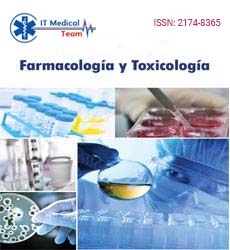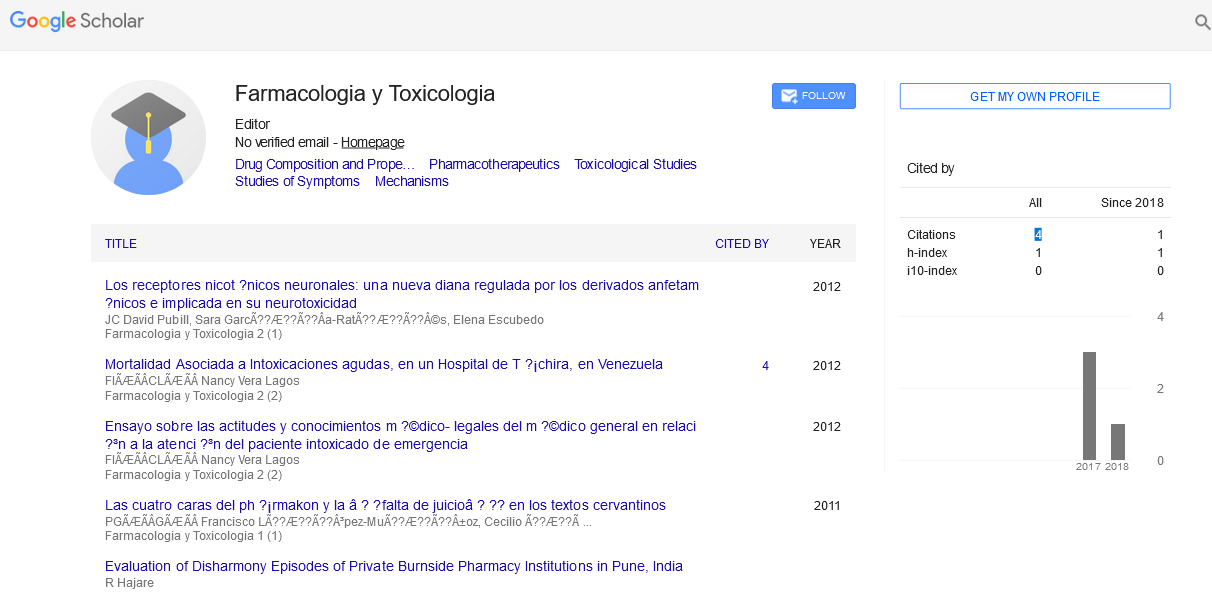Perspective - (2024) Volume 14, Issue 1
The Interconnected Realms of Pharmacology and Toxicology in Biomedical Science
Gonzalo Tortella*
Department of Pharmacology and Toxicology, University of kulland, Richards Bay, South Africa
*Correspondence:
Gonzalo Tortella, Department of Pharmacology and Toxicology, University of kulland, Richards Bay,
South Africa,
Email:
Received: 10-Jan-2024, Manuscript No. IPFT-24-14466;
Editor assigned: 15-Jan-2024, Pre QC No. IPFT-24-14466 (PQ);
Reviewed: 29-Jan-2024, QC No. IPFT-24-14466;
Revised: 07-Feb-2024, Manuscript No. IPFT-24-14466 (R);
Published:
15-Feb-2024
Introduction
Pharmacology and toxicology, two intertwined disciplines
within the vast realm of biomedical science, play pivotal roles in
shaping our understanding of drugs and substances' effects on
living organisms. While these fields are distinct, their shared
objectives and interconnected nature make them crucial
components of research, drug development and public health.
This article delves into the intricacies of pharmacology and
toxicology, exploring their individual definitions, historical roots,
methodologies and the evolving landscape of these disciplines.
Description
Defining pharmacology and toxicology
Pharmacology is the study of how drugs interact with living
organisms to produce therapeutic effects. It encompasses
various aspects, including drug discovery, development,
mechanism of action and their effects on the body.
Pharmacologists aim to understand how drugs can be used to
treat diseases effectively, exploring factors like dosage,
administration routes and potential side effects.
Toxicology, on the other hand, focuses on the adverse effects
of chemicals, including drugs, on living organisms. It involves the
study of toxins, their mechanisms of action and the
development of strategies to prevent or mitigate their harmful
effects. Toxicologists investigate how substances can cause
harm, studying factors such as dose-response relationships,
exposure routes and individual susceptibility.
Dose-response relationships
A fundamental concept shared by pharmacology and
toxicology is the dose-response relationship, which describes
the relationship between the dose (amount) of a substance and
its biological effects. While pharmacologists seek to determine
the optimal therapeutic dose that produces the desired effects
without causing harm, toxicologists aim to identify the threshold
at which a substance becomes harmful and the severity of
adverse effects at different exposure levels.
Historical roots
The roots of pharmacology and toxicology can be traced back
to ancient civilizations, where empirical knowledge of medicinal
plants and substances was passed down through generations.
The Ebers Papyrus, an ancient Egyptian medical text,
documented the use of various plants for medicinal purposes.
Similarly, early Chinese, Greek and Indian civilizations developed
their pharmacological traditions.
As time progressed, the middle ages witnessed the
emergence of alchemy, a precursor to modern chemistry, which
contributed to the understanding of chemical processes and the
isolation of medicinal compounds. The Renaissance period saw
significant advancements in pharmacological knowledge, with
the identification of active compounds from plants and the
development of early pharmaceutical preparations.
The 19th century marked a turning point with the isolation of
morphine from opium, leading to the birth of modern
pharmacology. Meanwhile, toxicology gained recognition in the
20th century, particularly with the advent of industrialization and
the increased use of synthetic chemicals. The tragic incidents of
thalidomide and diethylstilbestrol underscored the need for a
systematic approach to understanding the safety and efficacy of
drugs.
Methodologies in pharmacology
Pharmacological research employs a diverse array of
methodologies to unravel the complex interactions between
drugs and living organisms. Preclinical studies involve in vitro experiments using cell cultures and in vivo studies using animal
models to investigate a drug's safety and efficacy before human
trials. Pharmacokinetics and pharmacodynamics are critical
aspects, exploring how drugs are absorbed, distributed,
metabolized and excreted, as well as their mechanisms of
action.
Clinical trials are the next phase, where drugs are tested in
human subjects to assess their safety and effectiveness. These
trials follow a rigorous protocol and involve multiple phases,
from testing a small group of healthy individuals to large-scale
studies in patients with the target condition. Randomized Controlled Trials (RCTs) are the gold standard, providing robust
evidence for a drug's efficacy and safety.
Pharmacogenomics, a relatively recent addition to
pharmacology, focuses on how an individual's genetic makeup
influences their response to drugs. Understanding genetic
variations allows for personalized medicine, tailoring drug
therapies to an individual's unique genetic profile.
Methodologies in toxicology
Toxicological studies are equally diverse, aiming to identify
and understand the adverse effects of chemicals on living
organisms. Acute toxicity studies assess the immediate effects of
a substance, while chronic toxicity studies evaluate long-term
exposure effects. These studies utilize a range of animal models
and in vitro systems, often employing biomarkers to measure
toxicity.
Risk assessment is a crucial component of toxicology,
estimating the probability and severity of adverse effects in
exposed populations. Regulatory agencies rely on toxicological
data to establish safe exposure limits and guidelines for various
substances, ensuring public health and environmental safety.
Advancements in technology have enhanced toxicological
research, with the development of in silico models, such as
computational toxicology, allowing for virtual screening of chemicals. Additionally, the use of human-derived cells and
tissues in toxicological studies, known as in vitro toxicology,
offers a more human-relevant approach to assessing toxicity.
The interconnected nature
While pharmacology and toxicology focus on different aspects
of drug and chemical interactions, their interconnected nature is
evident in several key areas. One such intersection is the
concept of dose-response relationships. Pharmacologists study
the optimal dose of a drug that produces the desired
therapeutic effect without causing harm. In contrast,
toxicologists explore how varying doses of a substance can lead
to adverse effects, helping establish safe exposure limits.
Conclusion
Pharmacology and toxicology are two closely interrelated
disciplines within the vast realm of biomedical science, focusing
on the effects of substances on living organisms. While they may
seem distinct at first glance, their interconnected nature
becomes apparent when we delve deeper into their objectives,
methodologies and applications. In this article, we will explore
the essential aspects of pharmacology and toxicology,
highlighting their shared foundations and their unique roles in
understanding the impact of chemicals on biological systems.
Citation: Tortella G (2024) The Interconnected Realms of Pharmacology and Toxicology in Biomedical Science. Farmacologia Toxicologia Vol.14
No. 1





